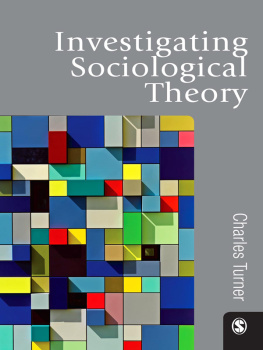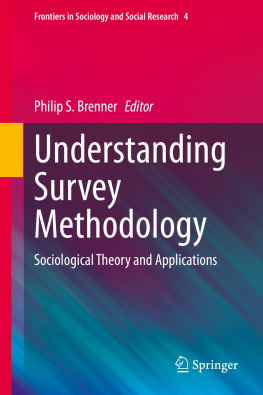Constructive Sociological Theory
Constructive Sociological Theory
Thomas G. Masaryk
Edited by Alan Woolfolk and Jonathan B. Imber
With an introduction by Alan Woolfolk

First published 1994 by Transaction Publishers
Published 2021 by Routledge 605 Third Avenue, New York, NY 10017 2 Park Square, Milton Park, Abingdon, Oxon OX14 4RN
Routledge is an imprint of the Taylor & Francis Group, an informa business
Copyright 1994 by Taylor & Francis
All rights reserved. No part of this book may be reprinted or reproduced or utilised in any form or by any electronic, mechanical, or other means, now known or hereafter invented, including photocopying and recording, or in any information storage or retrieval system, without permission in writing from the publishers.
Notice: Product or corporate names may be trademarks or registered trademarks, and are used only for identification and explanation without intent to infringe.
Library of Congress Catalog Number: 93-45995
Library of Congress Cataloging-in-Publication Data Masaryk, T. G. (Tom Garrique), 1850-1937. Constructive sociological theory : the forgotten legacy of Thomas G. Masaryk / Thomas G. Masaryk ; edited by Alan Woolfolk and Jonathan B. Imber ; with an introduction by Alan Woolfolk. p. cm. Includes bibliographical references and index. 1. SociologyPhilosophy. I. Woolfolk, Alan. II. Imber, Jonathan B., 1952- . III. Title. HM24.M2947 1994 340'.1dc20
93-45995 CIP
ISBN 13: 978-1-56000-164-5 (hbk)
DOI: 10.4324/9780429336645
Sociological theory can become constructive if, and only if, it uses its critical powers to plan a cultural reconquest of the therapeutic thought-world.
Philip Rieff
To J.W. and Amy
Contents
Alan Wolfe
Alan Woolfolk
Part One "Sacrifices of the Kulturkampf"
1. The Development of the Modern Suicide Tendency
2. Toward a Remedy for the Modern Suicide Tendency
3. Symptoms of the Transition Period
Part Two Philosophical Sociology
4. Essence and Method of Sociology
5. Comte
6. The Epistemological Problem of Russian Philosophy
Part Three The Religious Question and Humanity
7. The Religious Question and Modern Philosophy
8. First Principles of the Ethics of Humanity
9. The Religious Problem of Russian Philosophy
Part Four Contra Marx: "Reform, Not Revolution"
10. The Class Structure of Society
11. Central Problems of Marxist Policy
12. My View of Bolshevism
Part Five Nationalism without Chauvinism
13. Nationality and Internationalism
14. Jan Hus and the Czech Reformation
15. The Meaning of Our National Revival
16. Our Task and the Meaning of the Fight
Part Six The Democratic Spirit and the Work Ethic
17. Democracy versus Theocracy
18. Work in General
19. Democracy and Humanity
- Part One "Sacrifices of the Kulturkampf"
- 1. The Development of the Modern Suicide Tendency
- 2. Toward a Remedy for the Modern Suicide Tendency
- 3. Symptoms of the Transition Period
- Part Two Philosophical Sociology
- 4. Essence and Method of Sociology
- 5. Comte
- 6. The Epistemological Problem of Russian Philosophy
- Part Three The Religious Question and Humanity
- 7. The Religious Question and Modern Philosophy
- 8. First Principles of the Ethics of Humanity
- 9. The Religious Problem of Russian Philosophy
- Part Four Contra Marx: "Reform, Not Revolution"
- 10. The Class Structure of Society
- 11. Central Problems of Marxist Policy
- 12. My View of Bolshevism
- Part Five Nationalism without Chauvinism
- 13. Nationality and Internationalism
- 14. Jan Hus and the Czech Reformation
- 15. The Meaning of Our National Revival
- 16. Our Task and the Meaning of the Fight
- Part Six The Democratic Spirit and the Work Ethic
- 17. Democracy versus Theocracy
- 18. Work in General
- 19. Democracy and Humanity
Guide
Foreword
Thomas G. Masaryk's legacy is forgotten, of that there can be little doubt. I asked a number of colleagues, all of whom teach sociology, "Which founding sociological theorist wrote a great work on suicide and was also president of his country?" The results: no one could answer the question correctly. Most of my respondents, when told the answer, responded with surprise that Masaryk, whose name is generally recognized, perhaps because there were two of them, had anything to do with sociology.
We hope that the publication of this book will restore Masaryk to his rightful place as a sociological theorist. It is, after all, rather unusual to find someone so adept at both theory and practice. All the founding greats of European sociology, save Simmel, were intensely political beings who sought to influence the events of their time. Marx, of course, was, for most of his life, a revolutionary exile, but this did not prevent his active involvement in the affairs of the International. Max Weber, despite his efforts to draw distinctions between the man of science and the man of power, was close to the center of German Liberalism and the drafter of the Weimar Republic's constitution. Durkheim was an academic politician par excellence, not only establishing sociology but also creating a Durkheimian school; yet he also participated in the Dreyfus controversy, which inspired one of the best summaries of his thought. Only in America was the first generation of sociological thinkers ensconced in ivory towers, although, even here, Robert Park was an influential man of affairs.
What drove all these thinkers toward political practice was the close correspondence, in the social sciences, between abstract ideas and the testing of those ideas against reality. The materials with which social scientists work are different from those of the physical sciences in many ways, but surely among them is the fact that ideas about how the social world works directly affect how the social world works. Statesmen influence the course of events by directly trying to move history in one direction or another. Social theorists, by contrast, influence the course of events by finding patterns by which history can be understood, thereby changing future patterns of development. Social theory is a form of sublimated power-holding. The question for all great social theorists is not whether they seek powerit is more a question of how.
Masaryk sought power in two ways, by reflecting on what had happened and by trying to influence what was possible. At its best, his work reflects this dual seeking after influence. Consider, to take the most important example, the question of revolution and democracy. From Masaryk's perspective, communism was not only ethically problematic, but also sociologically absurd. "Revolution today is philistinism," Masaryk wrote of Marx. The Marxian project completely misunderstands the complexity of society by reducing all motives and desires to one thing. "The revolutionary is Rousseau's savage, frightened by the complexity of society. The revolutionary opposes evolution and progress, opposes real enlightenment. Revolution is gross political primitivism." For Masaryk, society is complex because people are; individuals are moral creatures who respond to the culture that responds to them.






